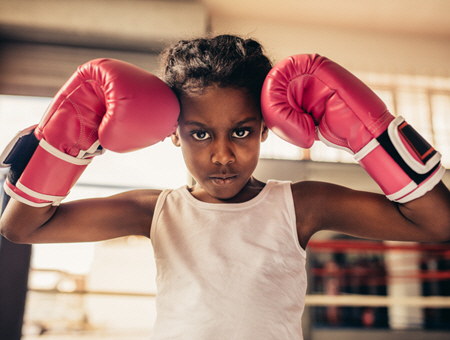 The eraser was the last straw.
The eraser was the last straw.
When I was in the third grade, my friend Megan* and I got into a fight – like an actual fight, WWE style. The war started over an eraser. I attempted to draw something at my desk and began frantically searching for my eraser. I couldn’t find it.
Then, I looked at Megan as she quickly moved her fist left and right across her desk. Enclosed in her fist was my eraser. I remember marching over to her desk and standing over her, burning with anger. I spoke in a high-pitched tone that any little kid has when pissed off.
I yelled, “Stop taking my stuff from me!” My small voice echoed across the classroom as heads turned toward Megan’s desk. She seemed not to understand what was happening, or maybe she thought I was joking. She shrugged her shoulders, looked down at her paper as she said to me, “In a minute – almost done,” and continued erasing away.
And just like that, I put on my imaginary boxing gloves, grabbed her by the shoulders, and the fight of our lives began. I can still picture the look of horror and shock on my teacher’s face as she witnessed it – eyes bulging out of her head as she struggled to get free from her large wooden teacher’s desk. It seemed to keep her trapped as Megan and I wrestled on the ABC carpeted floor. Megan looked shocked, confused, and hurt.
Confusion and hurt led to reflection.
Fast forward – as I sit in the principal’s office, reflecting on what happened. The fight confused and upset me because my third-grade brain couldn’t figure out why I was so mad. It was just an eraser, but I felt all this pent-up anger at my friend. The fight started because of the eraser, but there were previous signs I had missed.
Though Megan was my close friend, I realized she had one jarring flaw. She was always taking my stuff – without asking! It was as if she believed my things were hers and could use them as she pleased.
When I reflected on that event years later, I saw images of Megan grabbing the purple marker from my hands before I even finished using it. She borrowed my Polly’s Pocket toy without asking and not letting me know when I’d get it back. She borrowed my favorite purple jacket with no sign of when she would return it.
Little me became fed up! Hadn’t Megan recognized that her behavior was bothering me? Hadn’t she seen my neck stiffen when she grabbed the marker from my hand? Didn’t Megan hear me sigh with annoyance every time she “borrowed” anything? She hadn’t.
Part of me thought, “If she were my friend, she’d know the things that were okay to do with me and what wasn’t.”
 Without boundaries, others’ behaviors trigger you.
Without boundaries, others’ behaviors trigger you.
As an adult, I often thought similarly to my third-grade self. Then, I recognized how my thinking was flawed. I had failed in not setting clear boundaries.
For years, I struggled with setting boundaries with others and became increasingly uptight, unhappy, and miserable.
When you don’t set boundaries as a teen or an adult, it can leave you feeling filled with anger, resentment, annoyance, disappointment, and hurt.
You think to yourself, “No, this person knows me! She should know not to cross any of my boundaries.” But how can she know when you never communicate what those boundaries are?
I can help lift those feelings of resentment.
Many of us keep these boundaries to ourselves, like a best-kept secret – never daring to speak those boundaries aloud. Or we mentally communicate them to others as if we’re telepathic.
Unfortunately, most of us don’t have this superpower. We must learn to communicate our boundaries and needs to free ourselves from the burden of pent-up emotions.
Contact me for a free consultation if you’re ready to discover and work on your boundaries with family, friends, coworkers, and significant others.
*Name changed to protect client confidentiality.

